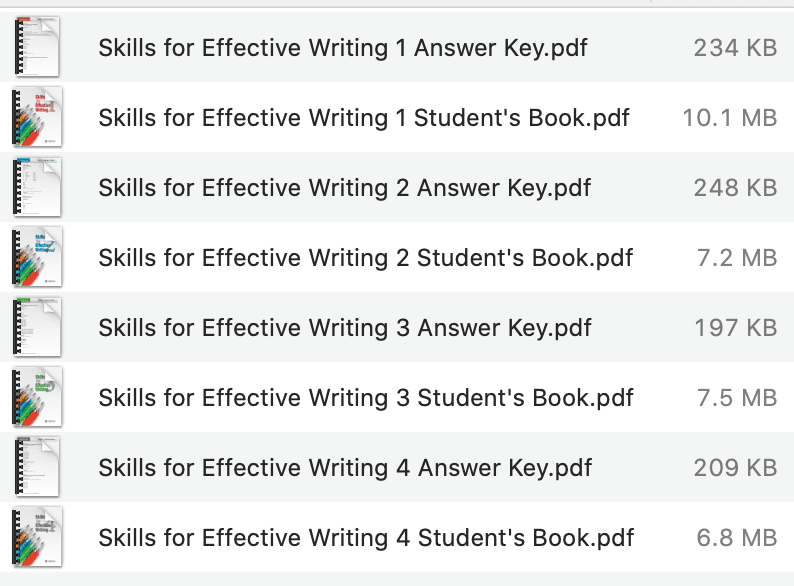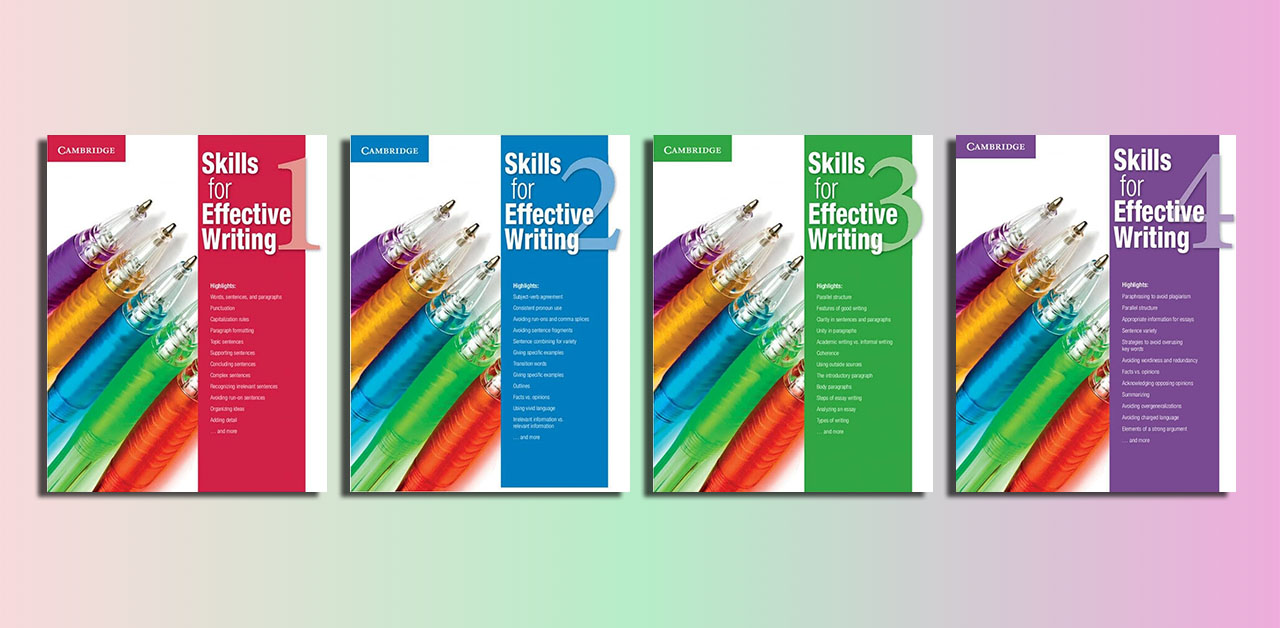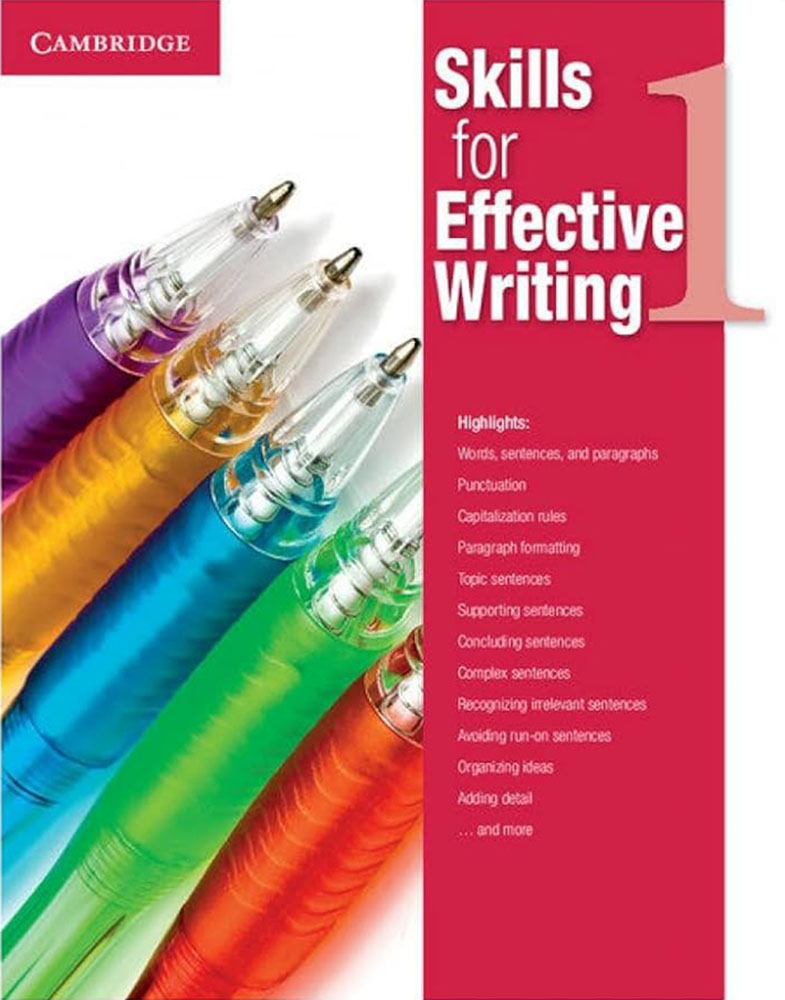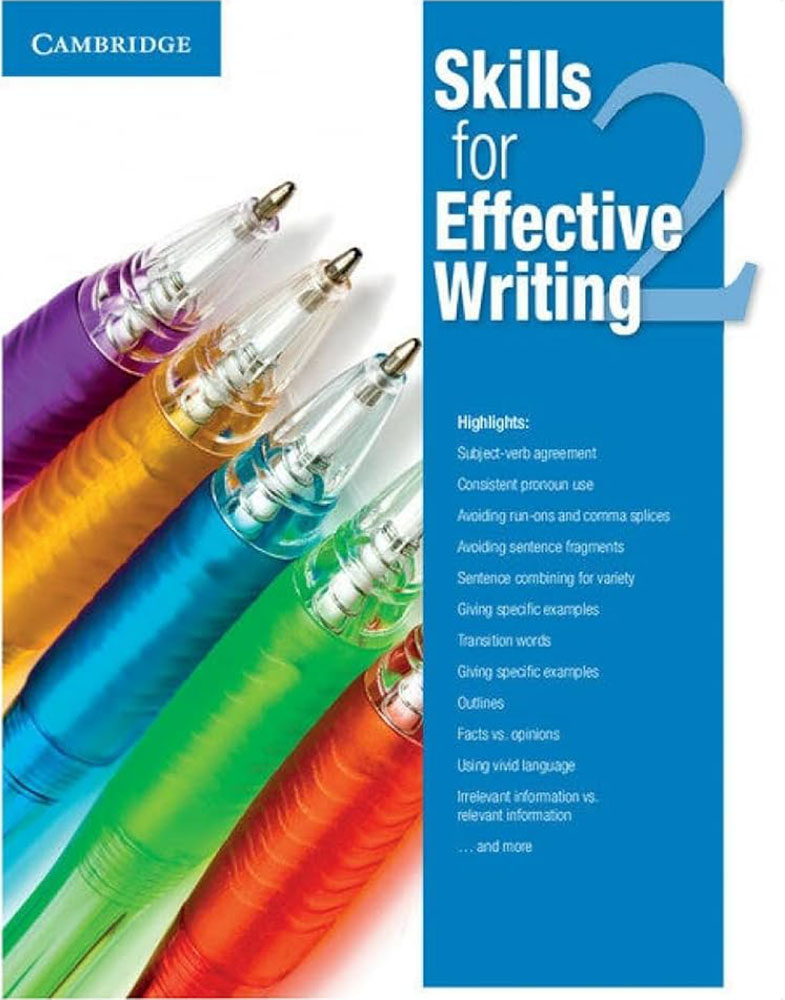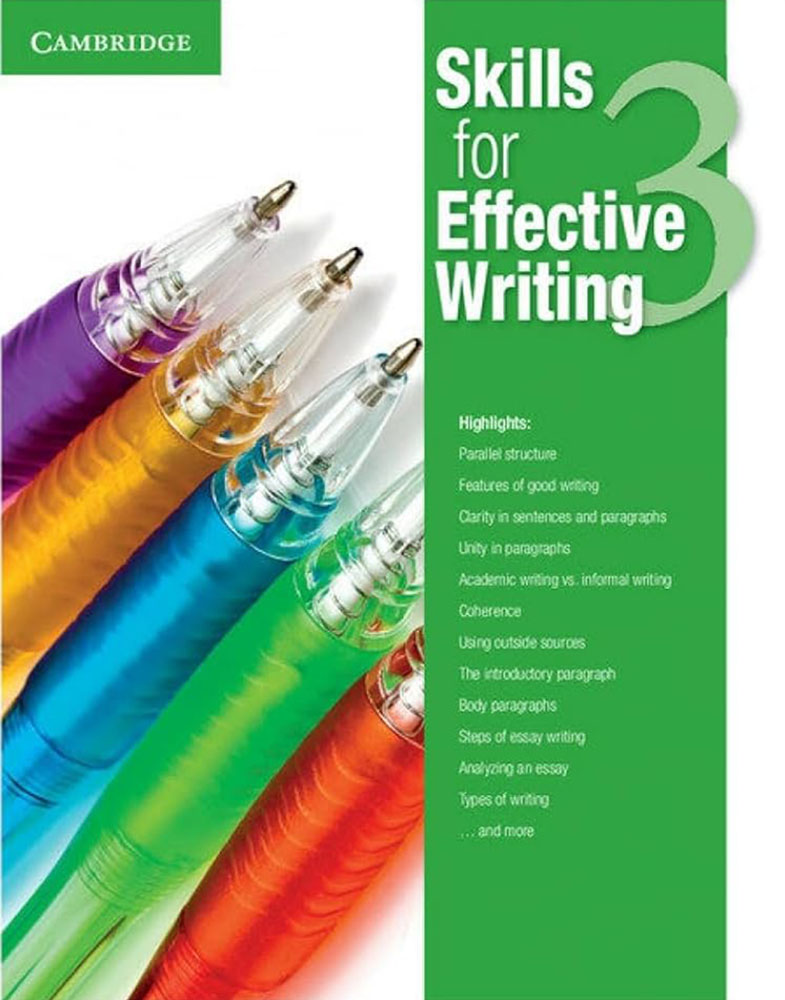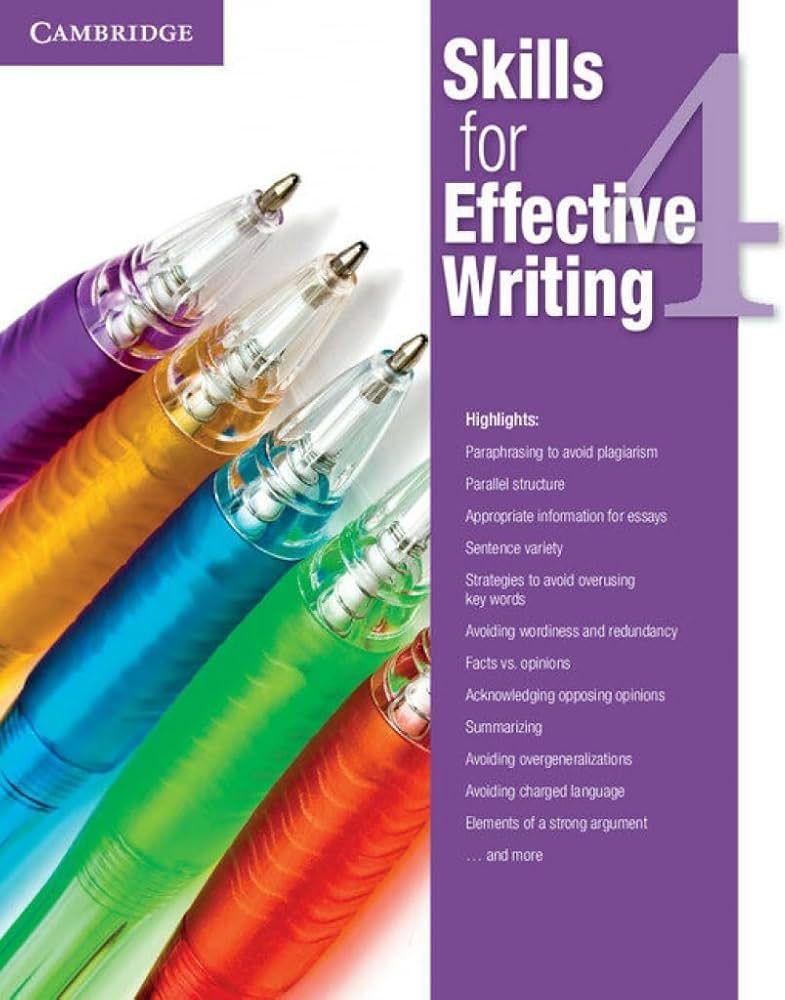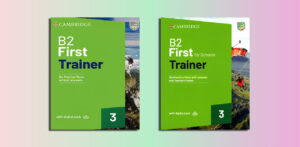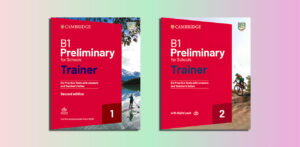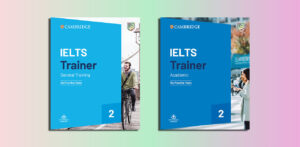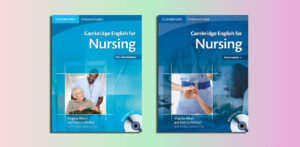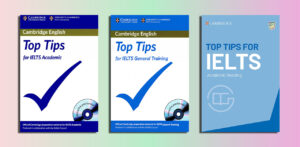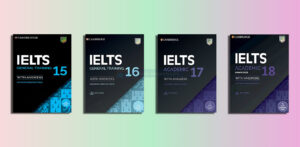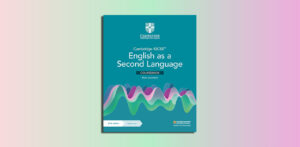Skills for Effective Writing (PDFs, Resources)
Level 1 (A1 – A2)
Skills for Effective Writing 1 Answer Key.pdf
Skills for Effective Writing 1 Student’s Book.pdf – Sample: Click
Level 2 (A2 – B1)
Skills for Effective Writing 2 Answer Key.pdf
Skills for Effective Writing 2 Student’s Book.pdf – Sample: Click
Level 3 (B1 – B2)
Skills for Effective Writing 3 Answer Key.pdf
Skills for Effective Writing 3 Student’s Book.pdf – Sample: Click
Level 4 (B2 – C1)
Skills for Effective Writing 4 Answer Key.pdf
Skills for Effective Writing 4 Student’s Book.pdf – Sample: Click
| Name | Price | Buy |
|---|---|---|
| Skills for Effective Writing - All 4 Levels (PDFs, Resources) | $8 |
Overview of the “Skills for Effective Writing” by Cambridge
Contents
| ✅ Coursebook: | Skills for Effective Writing |
| ✅ Publisher: | Cambridge University Press |
| ✅ Levels: | A1, A2, B1, B2 |
| ✅ English type: | American English |
| ✅ For: | Academic, Writing |
| ✅ Publication year: | 2013 |
- “Skills for Effective Writing” is a multi-level writing skills series (Level 1 through Level 4) aimed at learners of English.
- At each level, the series focuses on developing discrete writing skills (i.e., specific components of writing: sentences, paragraphs, topic sentences, supporting sentences, coherence, etc.).
- The idea: When learners master these component skills individually, their overall writing improves — and teachers can spend more time focusing on content rather than remediation of basic writing structure.
How it works / Structure
- Each unit (or “Skill”) in the book focuses on one writing skill (for example: “Topic Sentences”, “Supporting Sentences”, “Recognizing Irrelevant Sentences”, etc.).
- Typical sequence: Instruction or explanation → guided practice → application tasks → quiz. E.g., after a skill is taught, there is a “Skill Quiz” to check students’ understanding.
- The units are arranged from more foundational items (words, sentences, paragraphs) to higher‐level tasks (organizing ideas, essay writing, using outside sources) — especially at higher levels such as Level 3.
- Example from Level 1: early chapters include “Words, Sentences, and Paragraphs”; “Punctuation”; “What is a Noun?”; “Recognizing and Identifying Verbs” etc.
- At Level 3, topics include “Using Outside Sources of Information”, “Body Paragraphs”, “The Steps of Essay Writing”.
Key Features & Strengths
- Concrete focus on specific skills: rather than just “write an essay”, this series drills into the building blocks of writing (topic sentences, concluding sentences, supporting sentences, avoiding irrelevant information) which helps learners understand why writing works. For example: “recognizing irrelevant sentences” appears as a skill. Barnes & Noble+1
- Extensive practice: The series emphasizes many exercises for each skill so learners can truly master them. theunitedknowledge.com+1
- Assessment built in: Quizzes at the end of units give teachers and students feedback on mastery. Scribd+1
- Progressive levels: The series moves from foundational to more advanced writing tasks, making it suitable for learners at different stages.
- Teacher‐friendly: Because foundational skills are broken out, teachers can spend more time guiding content and higher-order tasks rather than dealing with very basic errors. Amazon
Skills for Effective Writing 1 Student’s Book
Who is suitable for “Skills for Effective Writing”?
The series Skills for Effective Writing by Cambridge is designed for English learners who need to build strong writing foundations step by step. It is particularly suitable for:
1. Students at Basic to Intermediate Levels (A2 – B2)
- Learners who are still developing grammar control and need guidance to write clear sentences and paragraphs. The series breaks writing into simple skills, making it easy to follow.
2. ESL/EFL Learners
- Students learning English as a second or foreign language who struggle with academic writing, sentence structure, or paragraph organization.
3. High School & College Preparation
- Students preparing for academic programs where writing is important—like essays, reports, or assignments—will benefit from the focus on structure, organization, and coherence.
4. Test Preparation Learners (TOEFL, IELTS, CEFR exams)
- Those preparing for exams that include writing sections. The series trains essential skills like topic sentences, supporting ideas, transitions, and unity, which are key for high writing scores.
5. Self-Study Learners
- Individuals who want to improve their English writing independently. Lessons are short, clear, and include practice activities and skill quizzes.
6. Teachers & Tutors
- Educators who need a systematic writing curriculum to teach step by step—from simple sentences to full paragraphs and essays. Ideal for classroom or tutoring use.
7. Students Who Struggle With Writing Basics
If a learner makes errors like:
- Writing run-on sentences
- Weak topic sentences
- Poor paragraph organization
- Repetition or irrelevant ideas
- This series is perfect for strengthening those weaknesses.
8. Adults Using English for Work
- Professionals who need clearer writing for emails, reports, or communication at work can also benefit, especially from levels 2–4.
Skills for Effective Writing 2 Student’s Book
The benefits of “Skills for Effective Writing”
1. Step-by-step skill development
- The series breaks writing into clear, manageable skills—like topic sentences, supporting details, sentence combining, and coherence. This makes learning easier and helps students build confidence gradually.
2. Improves writing accuracy
- By focusing on grammar in context, students reduce common errors such as fragments, run-ons, incorrect punctuation, and poor structure. This leads to clearer, more accurate writing.
3. Strong paragraph and essay organization
Learners master essential writing patterns:
- Topic + supporting + concluding sentences
- Logical order of ideas
- Unity and coherence
These are key to writing clear paragraphs and moving toward academic essays.
4. Designed for real progress
Each unit follows a consistent learning path:
Explanation → Guided examples → Practice → Skill Quiz
This structure ensures students don’t just read, but practice and master each writing skill.
5. Builds academic writing foundations
Higher levels introduce:
- Essay organization
- Thesis statements and body paragraphs
- Using transitions
- Summarizing and citing sources
Great preparation for school, university, and exam writing tasks.
6. Suitable for classroom or self-study
Easy-to-follow explanations and exercises make it useful for independent learners, while teachers benefit from a ready-made writing syllabus.
7. Supports exam preparation
The skills taught are directly helpful for:
- IELTS Writing Task 1 & 2
- TOEFL writing
- CEFR B1/B2 writing tasks
- Cambridge exams (KET/PET/FCE)
It strengthens structure, clarity, and coherence — essential exam scoring criteria.
8. Encourages logical thinking
Students learn how to organize ideas, avoid irrelevant sentences, and develop arguments logically — an important skill not only for writing but also for critical thinking.
9. Clear and simple explanations
Writing rules and techniques are explained in simple language with plenty of examples. Perfect for learners who struggle with complex academic textbooks.
10. Improves writing confidence
By mastering writing step by step, learners feel more confident writing emails, essays, assignments, and reports. The progress is measurable and motivating.
Skills for Effective Writing 3 Student’s Book
Effective learning strategies for “Skills for Effective Writing”
1. Follow the book in order
Each unit builds on previous skills. Don’t skip around—go step by step:
- Sentences → Paragraphs → Unity → Coherence → Essays
2. Learn the concept, don’t just do the exercises
Before answering, make sure you:
- Read the explanation carefully
- Study the examples
- Identify the rule or structure
This helps you apply the skill in real writing, not just in exercises.
3. Write your own examples
After each unit, write at least 2–3 original sentences or a paragraph using the new skill. Example:
- After learning topic sentences, write 3 of your own.
- After supporting ideas, develop one full paragraph.
Practice + production = real progress.
4. Keep a Writing Notebook
Create a notebook to record:
- Common mistakes and corrections
- Useful linking words (first, however, as a result…)
- Model sentences from the book
- Personal writing improvement goals
- Review this notebook weekly.
5. Use the “Skill Quiz” as revision
At the end of each unit, take the quiz seriously.
- If you score below 80%, review the unit before moving on.
- If you score 90%+, move to the next skill confidently.
Skills for Effective Writing 4 Student’s Book
6. Practice with real topics
After every 2–3 units, choose a real writing task and apply the skills:
- Email to a friend
- Short opinion paragraph
- Description of a place
- Mini essay
This connects book learning to real writing.
7. Focus on structure
For every paragraph:
- Write a clear topic sentence
- Add 2–3 supporting sentences
- Avoid irrelevant ideas
- End with a concluding sentence
This method ensures clarity and organization.
8. Use peer or teacher feedback
If possible:
- Exchange writing with a friend
- Ask a teacher to review once a week
- Use correction symbols or comments
Feedback = faster improvement.
9. Review grammar when needed
If you struggle with sentence basics (tenses, connectors), review grammar using:
- Cambridge Grammar in Use
- Language notes in the book
Better grammar = better writing accuracy.
10. Build writing habits
- Study 25–30 minutes a day, 4–5 times a week
- Do one unit every 2–3 days
- Write regularly—not just complete exercises
Consistency matters more than speed.

